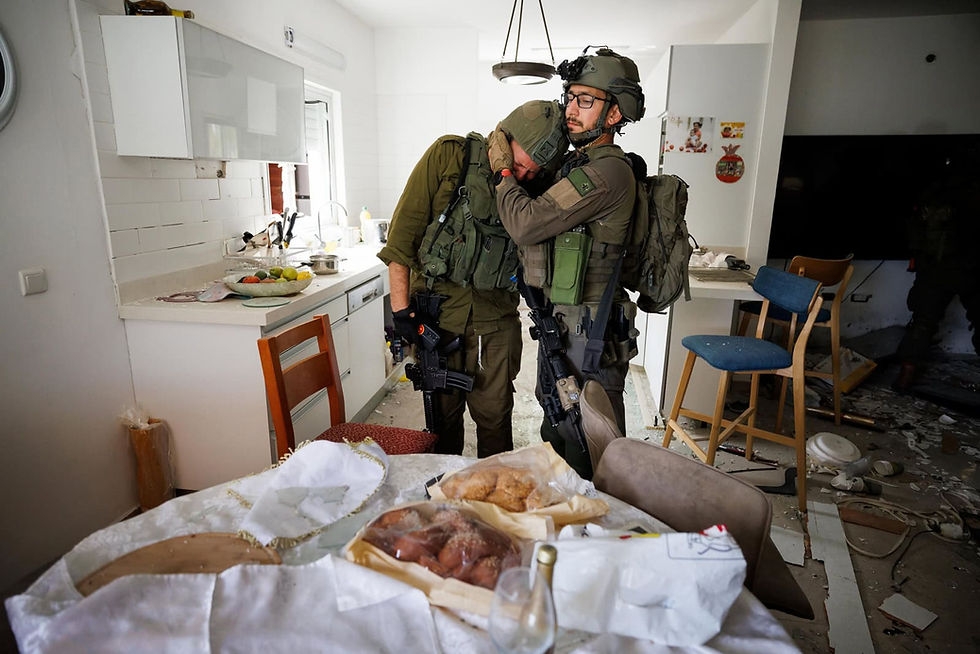Ziv Koren’s Photo Exhibition at the Peres Center for Peace and Innovation
- Gila Tolub

- Oct 8, 2024
- 3 min read
I recently had the privilege of visiting the Peres Center for Peace in Tel Aviv-Yafo. For those who are unfamiliar, the Peres Center is not just a landmark but a symbol of Israel’s enduring commitment to peace, innovation, and collaboration.
The center, founded over 25 years ago by the late President of Israel, Shimon Peres, and currently chaired by his son Hemi Peres, was created to foster partnerships across borders, cultures, and sectors, bringing people together through shared projects in health, education, and business.
This visionary institution reflects Peres’ belief in what he famously called the "crazy little thing called peace."
Efrat Duvdevani: A Lifetime of Service
At the helm of the Peres Center is Efrat Duvdevani, a woman whose career has been intertwined with the leadership and history of Israel.
As she introduced herself, Efrat reflected, “My first public role was working with Yitzhak Rabin, and after Rabin’s assassination, I began working with Shimon Peres. I accompanied him for 22 years, establishing innovative projects in the Galilee, serving as the CEO of the President's House, and today, leading this remarkable Center."
Efrat’s journey mirrors that of the country—one of perseverance and dedication. She shared how working alongside these giants of Israeli history shaped her understanding of leadership, innovation, and the importance of building a shared future. “Peres always believed that the essence of Israeli pride was innovation," she said, "and that innovation is about tikkun olam, repairing the world."
Innovation as a Pathway to Peace
The Peres Center is unique in its approach, using innovation as a tool to tackle global challenges. As you walk through its halls, the feeling is one of optimism, of looking forward to a future where innovation can solve the world’s most pressing issues—clean air, water, food security, and medical advances. Efrat eloquently put it, “What we see here is that innovation is, ultimately, a way to heal the world.”
She highlighted the importance of engaging with the next generation: “There’s a beautiful, four-floor tour designed for children that shows how we can create a better world through innovation.”
The Exhibition: A Story of Resilience and Hope
Currently, the Center hosts an emotionally charged exhibition by photographer Ziv Koren, documenting the traumatic events of October 7, 2023, and its aftermath. Efrat explained the exhibition's layout, “It’s not arranged chronologically, but by themes—portraying individual and collective resilience.” One of the most moving stories is that of a young couple who survived the Nova music festival. After nearly losing hope, both are now on the path to recovery, and Ziv, the photographer, has committed to documenting their wedding, saying, “I’m not a wedding photographer, but I’ll be the photographer for your wedding.”

The exhibition also captures deeply personal moments, such as those of mothers waiting for their children to return, survivors coming together for the first time since the events, and communities devastated but resilient. One particularly haunting image is that of the tunnel in Khan Younis, which, for many Israelis, evokes the claustrophobic fear experienced by captives during the war.
As Efrat emphasized, “We believe that a picture is worth more than a million words,” making this exhibition a powerful way to bridge understanding both for Israelis and for those around the world who may have forgotten the gravity of what occurred. The goal is clear: to ensure that these stories are not forgotten, and to invite the world to witness the resilience of the Israeli people.
A Call to Action
As I left the exhibition, Efrat’s closing words resonated deeply:
“Optimism is not a privilege; it’s a work plan.”
She said this is what Shimon Peres would tell us today.
The Peres Center is not just a place where past and present meet but where the future is actively being shaped. Efrat, with her lifelong dedication to peace and innovation, exemplifies this spirit of forward-thinking optimism, showing that even in the darkest moments, there is always a path toward light.
I encourage everyone, whether Israeli or from abroad, to visit the Peres Center, explore the exhibition, and reflect on the power of innovation to change the world. In Efrat’s words, “We are open nonstop—Friday, Saturday, every day—because this exhibition, and this center, is our mission.”
Whether you come to witness the photos that tell the story of a nation, or to engage with the Center's cutting-edge work in innovation, I promise it will leave you inspired. Let's pass the baton forward, as Efrat suggests, and continue this mission for peace and innovation.
Please Note: The exhibition includes content that is not easy to view.
Ticket Price: 40 ₪
Visits must be pre-booked through the website.
Part of the proceeds designated to the Hostages and Missing Families Forum



Comments